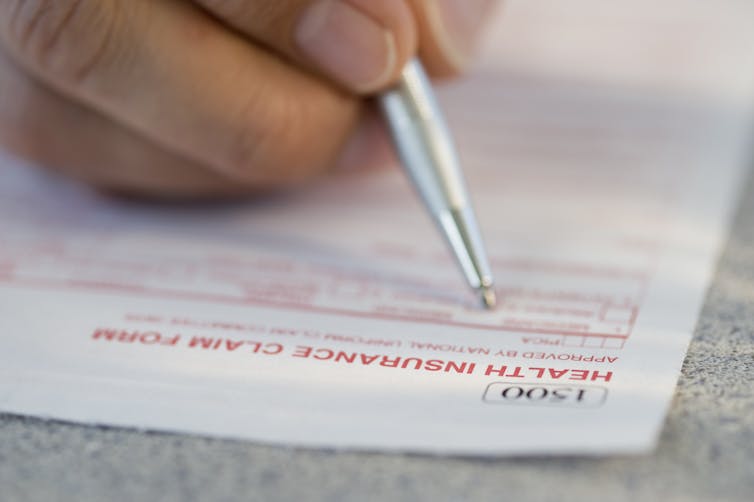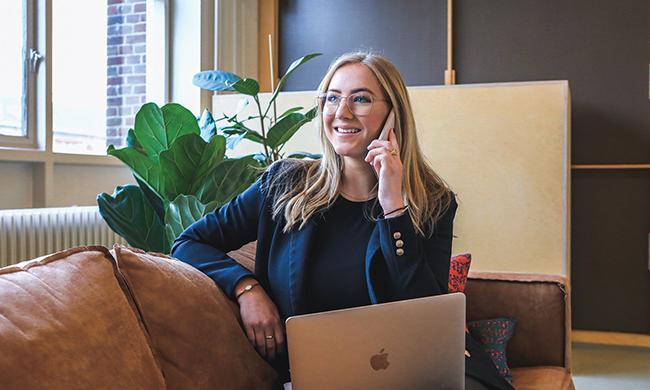financial wellness
Preventive care is free by law, but many Americans get incorrectly billed − especially if you’re poor, a person of color or don’t have a college degree
Preventive care costs exacerbate health disparities, disproportionately affecting marginalized communities. Insurance claim denials are higher for minority and low-income patients despite legal exemptions.

Alex Hoagland, University of Toronto and Michal Horný, UMass Amherst
Even though preventive care is supposed to be free by law for millions of Americans thanks to the Affordable Care Act, many don’t receive recommended preventive services, especially racial and ethnic minorities and other at-risk patient groups.
The Affordable Care Act exempted preventive services from patient cost-sharing for large chunks of the population. This means that if you receive preventive screening and have private insurance, including through the ACA Marketplace, there should be no copay at time of service, and you shouldn’t get a bill later on. Easy enough, right?
Wrong. Our team of health economists has shown that patients spend millions of dollars every year on unexpected bills for preventive care. The main reason for this is that no specific regulations were put in place to determine exactly which services should be exempted, or for whom, or how often. This omission has left many people on the hook to pay for valuable health care they thought would be free.
Now, in our recently published research in the journal JAMA Network Open, we’ve found that the burden of paying for what should be free preventive care disproportionately falls on some patient groups.
Inequitable claim denials
Looking at data from over 1.5 million patients, our study demonstrates that insurers deny preventive claims for patients from marginalized communities at higher rates than for those from majority groups.
For example, low-income patients were 43% more likely than high-income patients to have their claims denied. In addition, Asian, Hispanic and non-Hispanic Black patients were each roughly twice as likely as non-Hispanic white patients to have claims denied.
Not only were these patients denied routine benefits, but they also saw large differences in rates of billing errors. For example, patients with a high school diploma or less experienced denials due to this kind of billing error almost twice as often than patients with college degrees. All of these services should have been covered by an insurer.
Research on preventive care access is commonly based only on claims data, which doesn’t typically have information on patient demographics. This limits a study’s ability to detect differences across patient groups. Our study, however, uses a combination of linked claims data, remittance data containing information on why claims were denied and whether they were resubmitted, and demographic data from self-reports, purchase transactions and voter registries. Together, this richer dataset allowed us to examine differences in denials based on race and ethnicity, education and income, including reasons why patients were denied care.
Preventive care is essential
Equitable access to preventive health care is about more than just physicals, although those are important, too. Preventive health care includes key screenings for cancers, cardiovascular disease and diabetes, access to contraceptives, and mental health checkups, among other services. Ensuring that insurers provide equal coverage for these services for all patients is important to improve health outcomes and quality of life for everyone while reducing future health care costs.
Our results paint a picture of the kinds of hurdles patients face when they seek health screenings. Patients from underrepresented groups were not only more likely to be told their care wouldn’t be covered. They were also more likely to have their claims processed incorrectly, leading to more frequent denials and, ultimately, larger medical bills. https://www.youtube.com/embed/Uc2uG6LhFQQ?wmode=transparent&start=0 Few patients appeal claim denials, even though rejections may be unjustified.
Unexpected bills can affect both a patient’s current health and their future use of health care services. These hurdles can exacerbate an already tenuous trust in a fragmented health care system, making patients less likely to return for follow-up screenings.
Stacked coverage denials for patients who live with multiple marginalized identities or who are less able to advocate for themselves can further entrench racial and socioeconomic inequities.
Ensuring equitable access
Our study paints a compelling picture of where different patients may face hurdles for getting preventive care, but more research is necessary to identify how to ensure equitable access.
As our study looked only at preventive services, we will also need to see how our findings generalize to other forms of health care. More research is also needed to understand how other vulnerable patient groups, such as LGBTQ+ patients or patients with multiple chronic conditions, fare when trying to access care.
Our team is currently studying how actual bills for care differ across patient groups and how patients respond when bills arrive. In our study, more than two-thirds of denied claims were never resubmitted to insurers, meaning that many billing errors go uncorrected at patients’ expense.
Equitable policy on multiple fronts can help rectify the way preventive care is inconsistently and inequitably provided. These include uniform coverage of preventive care by insurers, standardized billing practices for physicians and improved means for patients to advocate for themselves. This can help ensure that everyone has appropriate access to lifesaving health care.
Alex Hoagland, Assistant Professor of Health Economics, University of Toronto and Michal Horný, Assistant Professor of Health Policy and Management, UMass Amherst
This article is republished from The Conversation under a Creative Commons license. Read the original article.
Our Lifestyle section on STM Daily News is a hub of inspiration and practical information, offering a range of articles that touch on various aspects of daily life. From tips on family finances to guides for maintaining health and wellness, we strive to empower our readers with knowledge and resources to enhance their lifestyles. Whether you’re seeking outdoor activity ideas, fashion trends, or travel recommendations, our lifestyle section has got you covered. Visit us today at https://stmdailynews.com/category/lifestyle/ and embark on a journey of discovery and self-improvement.
Discover more from Daily News
Subscribe to get the latest posts sent to your email.
Lifestyle
Preparing Students for What’s Next in Work
Preparing Students: Automation, AI and societal economic changes are affecting the workforce and making a significant impact on the employment prospects of future generations. Consider this guidance to put students on the path toward greater earning potential and economic mobility in a rapidly changing economy.

Preparing Students for What’s Next in Work
(Family Features) Automation, AI and societal economic changes are affecting the workforce and making a significant impact on the employment prospects of future generations. More than one-third of today’s college graduates are “underemployed,” meaning they work jobs that don’t require a college degree and may pay less than a living wage, according to data from the Federal Reserve Bank of New York. At the same time, a World Economic Forum report explored how advances in AI are threatening to negatively impact access to entry-level and even mid-level jobs for millions of Americans. Looking ahead, research by Georgetown University indicates that by 2031, 70% of jobs will require education or training beyond high school. However, data from the National Center for Education Statistics indicate only one-third of high school graduates go on to complete a college degree with many of those being in fields that are not in high-earning, high-growth professions. These challenges are not lost on today’s students. In a survey by Junior Achievement and Citizens, 57% of teens reported AI has negatively impacted their career outlook, raising concerns about job replacement and the need for new skills. What’s more, a strong majority (87%) expect to earn extra income through side hustles, gig work or social media content creation. “To put students on the path toward greater earning potential and economic mobility in a rapidly changing economy, students need proactive education and exposure to transferable skills and competencies, such as creative and critical thinking, financial literacy, problem-solving, collaboration and career planning,” said Jack Harris, CEO, Junior Achievement. This assertion is consistent with findings from the Camber Collective. This social impact consulting group identified four key life experiences students can consider and explore that positively affect lifetime earnings, including:- Completing secondary education
- Graduating with a degree in a high-paying field of study
- Receiving mentorship during adolescence
- Obtaining a first full-time job with opportunity for advancement
- Learning opportunities that are designed with the future in mind. For example, learning experiences offered through Junior Achievement reflect the skills and competencies needed to promote economic mobility.
- Internships or apprenticeships that provide hands-on experience and exposure to a career field that can’t be found in a textbook.
- Volunteer or extracurricular roles that develop communication and leadership skills. Virtually every career field requires these soft skills for growth and greater earning potential.
- Relationships that provide insight and connection. Networking with individuals who are already excelling in a chosen field, as well as peers who share similar aspirations, offers perspective from those who are where you wish to be and potentially opens future doors for employment.
- Courses that offer introductory insight into a chosen career path. Local trade or technical schools and other training organizations may even offer certifications that align with a student’s area of interest.
Discover more from Daily News
Subscribe to get the latest posts sent to your email.
home improvement
5 Ways to Trim Home Energy Bills
Last Updated on January 4, 2026 by Daily News Staff
(Family Features) After the mortgage, utility costs, including electricity, likely make up one of the most significant portions of monthly budgets for the typical American household. In fact, according to data from the U.S. Energy Information Administration, the average residential electric bill in the United States is $143.
However, reducing your family’s energy costs is possible by following some smart, practical, cost-cutting tips from the heating and cooling experts at Mitsubishi Electric. Consider these ways to help dial down your energy bills.
Service HVAC Systems Regularly
To ensure the best performance and efficiency possible, find a licensed contractor to keep your heating and cooling system well-maintained and serviced throughout the year. There are some tasks many homeowners can handle on their own, like keeping outdoor units free of debris and changing air filters. Some filters are removable and washable, saving you money. However, bringing in a professional 1-2 times a year for maintenance and to ensure proper function of ductwork and electrical components is also essential.
Use Appliances During Non-Peak Hours
Rather than using stoves, ovens and clothing dryers in the afternoon hours, consider doing so early in the morning or late in the evening. Peak time for many electricity providers is noon-6 p.m., meaning using these appliances outside of this timeframe when conventional heating and cooling systems are likely running full throttle can help lower energy costs.
Upgrade Your System
The Inflation Reduction Act (IRA) incentivizes homeowners that opt for energy-efficient air-conditioning and heating options to replace fossil-fuel-fired furnaces. This includes upgrading your existing HVAC system to a qualified heat pump. For example, Mitsubishi Electric heat pumps provide more energy-efficient cooling and heating that equals cost and energy savings as well as a reduced carbon footprint for homeowners.
Installing a smart electrical panel alongside an all-electric heat pump enables homeowners to monitor and control energy consumption on-site or remotely using a smartphone for better overall efficiency and utility cost savings.
Harness the Sun’s Energy with Solar Panels
According to the Office of Energy Efficiency & Renewable Energy, the amount of sunlight that strikes the Earth’s surface in 90 minutes could power the world’s total energy usage for a full year. Investing in solar panels can help decrease energy bills and increase your home’s sustainability. Additionally, some utility providers and government entities, including the IRA, offer incentives to help reduce installation costs.
Avoid Heating or Cooling Unused Spaces
One mistake many homeowners make is forgetting to adjust their temperature settings when leaving the house. Whether you’re headed out for the weekend or just headed to work for the day, running your system in an empty house can result in unnecessarily high utility bills.
Multi-zone, all-electric heat pumps like those from Mitsubishi Electric allow homeowners to set the comfort level and adjust the temperature in each room, reducing the energy waste of cooling unoccupied rooms. With a smartphone app, you can even adjust the settings remotely.
Find more ways to increase energy savings while making your home more sustainable by visiting MitsubishiComfort.com.
Photo courtesy of Getty Images
SOURCE:
Mitsubishi Electric
Discover more from Daily News
Subscribe to get the latest posts sent to your email.
Business and Finance
Make Your Job Work for You
Last Updated on December 31, 2025 by Daily News Staff
Make Your Job Work for You
(Family Features) For some people, job dissatisfaction is the result of a crummy boss or stifling work environment. For others, the problem lies much deeper; it’s a need to reevaluate your career path and find a more suitable fit.
If you’re considering a career change but not sure which direction you’re headed, consider these words of wisdom:
Do some self-reflecting. Take time to give your current work situation a thorough analysis. Determine which elements you enjoy, what rubs you the wrong way and what you’d change if you could. Think about practical solutions to the problems you identify whether it’s changing to a different role in the same field or exploring a new industry entirely. Avoid the temptation to focus on the negative. Rather, take plenty of time to consider the positive aspects of your current job, since that insight can help inform your next step. For example, if you enjoy the limited contact you have with customers, a job with more customer-facing interaction might not be a good fit.
Ask for input. Sometimes loved ones hold the key to a happier career path because they can point out details you don’t recognize. They might recall a time when you were most relaxed and happy, or they might point out talents or skills you take for granted. Often, these natural abilities are an excellent foundation for a career because you’re well-equipped to be successful.
Consider your personal interests. Keeping your personal life and professional life separate isn’t necessarily a bad idea but finding a way to merge the two can be useful. This is especially true if you’re able to combine training or skills with something you’re passionate about. For example, if you’re an avid outdoorsman, you might find great satisfaction in applying your business management background to work for a company that specializes in camping gear.
Understand what motivates you. Landing in the right job isn’t just about having the right qualifications for a position that interests you. At the end of the day, you’ll feel most content when your job offers meaningful rewards. Motivators can be financial, or they might have more to do with the ability to learn and grow. Some people are willing to sacrifice a bigger paycheck to know they’re making a meaningful contribution in a field they care about. Knowing what outcomes resonate best can help you find a more rewarding career.
Do your research. Changing your career path is a big move, and one you shouldn’t take lightly. Before diving in, spend time looking into the field you’re considering so you have a better sense of factors like growth opportunities, job availability, qualifications, compensation and more. If you find you aren’t quite qualified for the job you think you want, explore what it will take to get there whether it’s training, education or putting in your time to gain experience and work your way into the role you desire.
A career change may be just what you need to shift your life in the direction you want. Find more career advice at eLivingtoday.com.
Photo courtesy of Unsplash
SOURCE:
Family Features
Discover more from Daily News
Subscribe to get the latest posts sent to your email.
